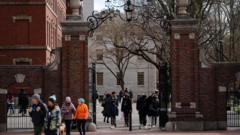In a surprising move, the Trump administration has threatened to prohibit Harvard University from enrolling foreign students, creating a tense standoff between the iconic institution and the federal government. This ultimatum follows the university's refusal to comply with a series of demands aimed at combating alleged antisemitism on campus.
Homeland Security Secretary Kristi Noem publicly accused Harvard of jeopardizing national security, claiming the school was capitulating to antisemitic sentiments while also demanding records concerning the activities of foreign student visa holders that she branded as "illegal and violent." With international students comprising over 27% of Harvard's current enrollment, the impact of such a ban could be significant for the university.
In response to the pressure, Harvard President Alan Garber asserted the institution's commitment to uphold its independence and constitutional rights, firmly stating, "The university will not surrender." The standoff comes at a time when Harvard's financial security is at risk; the federal government has already frozen $2.2 billion in funding, with additional threats to remove tax exemptions that could incur hefty financial losses for the institution.
Former President Trump took to his social media platform to decry Harvard's standing in higher education, asserting, "Harvard can no longer be considered a decent place of learning" and questioning its eligibility for federal funds. This attack on higher education institutions is part of a broader campaign initiated by Trump during his presidency, targeting universities he perceived as antagonistic toward conservative viewpoints.
The conflict is part of a larger pattern, as the administration has scrutinized campuses with pro-Palestinian protests, which some Jewish students claim have created an unsafe environment. Following similar allegations, Columbia University was compelled to comply with numerous federal demands after facing the withdrawal of $400 million in federal support.
While Harvard has made previous concessions, including dismissing certain leaders associated with its Center for Middle Eastern Studies, the university has yet to publicly address Secretary Noem's most recent demands. As the standoff continues, all eyes will be on how Harvard navigates this delicate situation and the potential consequences of its decisions.





















